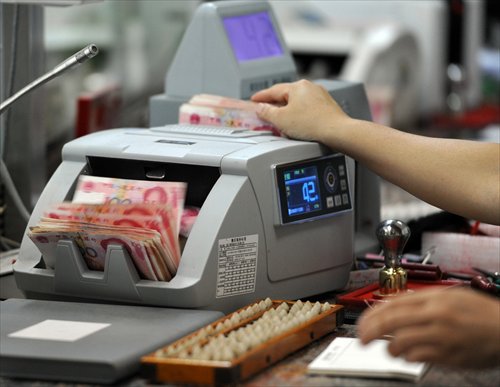BoCom to launch reform
More State-controlled banks will follow suit, say experts

A staff from a bank in South China's Hainan Province counts money. Photo: CFP

Bank of Communications (BoCom), the country's fifth largest lender by market value, has been approved by the State Council to carry forward a reform plan to further diversify its ownership, the company said Wednesday.
The bank will optimize its ownership structure and introduce more private shareholders, it said in a filing to the Shanghai Stock Exchange.
Other reform measures include an incentive mechanism that allows employees to own stocks of the company. The personnel management and salary structure will also be adjusted, according to the filing.
The central government has been pushing forward reform of State-owned enterprises (SOEs) to inject more vitality into the sector. A number of non-financial SOEs have already started their own reforms, such as energy giants China National Petroleum Corp and China Petrochemical Corp.
"BoCom's move marks the beginning of the reform of major commercial banks," Lu Hongjun, president of the Shanghai Institute of International Finance, told the Global Times Wednesday, noting that other banks may follow in BoCom's footsteps.
In May, the State-owned investment company Central Huijin Investment sold off some of its shares in Industrial and Commercial Bank of China (ICBC) and China Construction Bank (CCB), signaling that ownership reform of the banking sector was about to begin, Sinolink Securities said in a research note sent to the Global Times Wednesday.
Bank of China and CCB are expected to launch similar reforms soon, the note said.
BoCom already has a very diversified shareholding structure compared with its larger peers, which makes it easier to conduct ownership reform, experts said.
The Ministry of Finance (MOF) is BoCom's largest shareholder owning 26.53 percent stake, followed by Hong Kong Securities Clearing Company Nominees Ltd and HSBC Bank, with 20.09 percent and 18.7 percent stake respectively, according to information on BoCom's website.
In comparison, its peers like ICBC are still largely controlled by the MOF and the Central Huijin Investment Ltd.
BoCom stock price increased a slight 0.79 percent on Wednesday on the news. But its stock has surged 30 percent since the beginning of June, boosted by prospects of reform.
A research note from China Securities said that private investors are expected to hold stakes of under 5 percent in BoCom after the reform, Guangzhou-based newspaper the 21st Century Business Herald reported Wednesday. BoCom also noted in the filing that State investors will still hold a controlling stake after the reform.
Liang Jun, a research fellow with the Guangdong Academy of Social Sciences, told the Global Times Wednesday that though BoCom is now welcoming private shareholders, the access is still restricted to large private firms.
The market value of BoCom now stands at around 640 billion yuan ($103 billion), which means one needs more than 6 billion yuan to gain a 1 percent stake in the company.
BoCom has held talks with privately owned conglomerate Fosun Group and Internet giant Tencent Holdings on potential stake sale, according to the 21st Century Business Herald report.
Another important part of BoCom's reform is to try out employee stock ownership plan, according to the BoCom filing.
"It [the employee stock ownership plan] could effectively motivate employees. It will also be an important part of the reform for other commercial banks," said Lu from the Shanghai Institute of International Finance.
BoCom's smaller peer, China Merchants Bank, said Wednesday it had approved a plan to incentivize employees via a stock ownership plan. China Minsheng Bank and Bank of Beijing are also considering similar plans, recent media reports said.
State-controlled banks are facing increasing competition from Internet financing as well as private banks. WeBank, the first private bank in the country which is backed by Tencent, started trial operation in January. More private banks are expected to be started amid government support, experts said.
The dominant State-controlled banks have faced incessant complaints from customers about unsatisfactory service and high fees, but things may change after the reform of the sector, experts said.
"The reform [of commercial banks] is expected to help banks bring down costs, reduce risks and raise competitiveness," Lu noted.